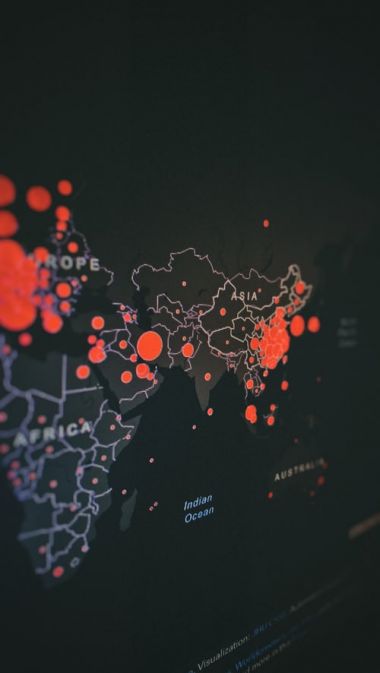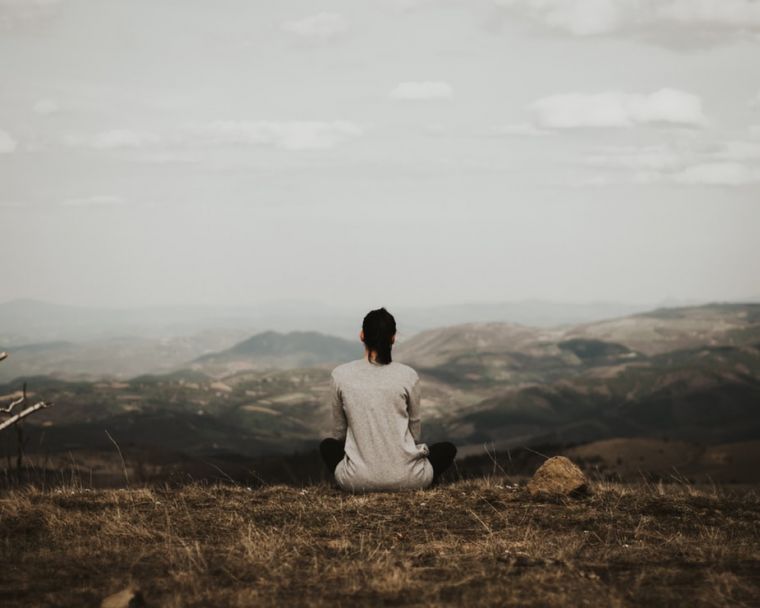What does a Christ-like response to coronavirus look like?

Covid-19 is a global pandemic. This means that there is ongoing transmission worldwide, and it is expected to spread everywhere. Even using the most optimistic of the credible models, it's important that we all understand that a lot of people are going to die and at least for a time, our way of life has had to change. Christians everywhere are being challenged by this, and our response as the global church could shape society's view of us for a generation.
We who are writing this article are two brothers – an NHS doctor and a theologian - and we have brought our perspectives together (using appropriate social distancing measures!) to offer some thoughts on how best to think and act as Christians in this situation.
1. Keep a large perspective
While this experience may be new to us, it is actually as old as human history. There have always been plagues, and societies have had to make large-scale changes because of major world events throughout history. For many of us living comfortable lives in politically stable countries, this will be the first time we've had to deal with this level of population-wide adversity. But for some of our brothers and sisters worldwide, this is only the latest of a series of major disruptions, which we will discuss later.
Moreover, plagues have played a key role in the growth of Christianity. Two great pandemics struck the Roman empire: the first in AD 165 and the second in AD 249. The mortality rate is hard to know for sure, but could have been up to 30%. But this is the interesting thing: the survival rate for Christians – and people who were friends with Christians – was much higher.
This was not because of large-scale healing miracles – on the contrary, if such healings occurred, we have no records of them. Very simply, it is because the pagans ran as fast as they could from anyone showing any symptoms. By contrast, Christians were self-sacrificial and cared for those around them even at the risk of their own lives. Even though many Christians lost their lives through these selfless acts, they preserved the lives of more than they lost. This meant that when the plague ended, the proportion of Christians – and of people who knew a Christian – in the population was far higher than it had been beforehand.
This does not make the plague a good thing in itself. Nor is it a good thing in itself that more non-Christians died than Christians. Every life is equally valuable. But that is precisely one of the things these Christians teach us, since they cared for non-Christians and fellow Christians alike. And it shows that God can turn any situation and use it to display his character in the world.
We can learn many other things from these examples of great-yet-ordinary Christians in history, and we hope to unpack some of them below. Right now we want to make only the simple point that we've been through this before, and we'll get through it again. We're not in an especially horrific or abnormal situation, from a big picture point of view. Instead of getting caught up in the panic of the moment, let's keep a large, historical perspective with the maturity that comes from centuries of experience. Perhaps it would also help to remember God's 'perspective', as the author of all history, sovereign over the past, the present and the future.
2. Act as we want everyone to act
As Christians we are called to care about society as a whole, because this is one way to love our neighbours, even the ones we don't know personally. In this pandemic there are some really simple, if not particularly sensational ways of caring for society. Staying at home (rather cryptically termed 'social distancing') is to pandemic spread what voting is to politics. As an individual it doesn't seem to make much difference and certainly won't be celebrated, but en masse it is the greatest weapon that we have to fight the virus at present. It's also a way to show respect to those such as nurses, delivery drivers, carers, policemen and bus drivers who are doing their jobs in the face of genuine dangers.
3. Think of those less fortunate than ourselves
It's hard to be generous and compassionate when faced with any threat. Fear makes us turn inwards to worry about our own needs and forget those of others. It's with shame that even as we talked about this article we found ourselves first concerned with how this crisis would disrupt our own lives, even though in many ways we are among those who would be least affected.
At the forefront of many Western minds right now are questions like: How will this affect my career, budget, social life? Will I have enough food? Will I go crazy from isolation? This 'me-first' attitude showed itself in the panic-buying of food and toilet paper at supermarkets, where we rushed to secure our own futures without stopping to consider the effect on other people.

The same self-preservation instinct can lead to the opposite danger: not taking the COVID-19 pandemic seriously enough because it is unlikely to affect us personally. A lot of the media narrative about the Case Fatality Rate (CFR) was quick to report that most of those who die are older than 65 and have multiple chronic health conditions. There is a risk that younger readers see this, shrug, and continue with life as usual, thinking: "who cares if I get the flu again; this is all overblown."
But as this article pointed out, even a 1% mortality rate is enough reason to take this pandemic seriously and do whatever it takes to stop it. We worship a God who cares about the weakest people in society. He is the good shepherd who leaves the 99 sheep to go after the one (Luke 15:4-6). If we want to follow Jesus' example, we must consider it worth all the inconvenience of altering our lifestyles, even if our actions only keep one person alive who would otherwise have died.
4. Have compassion that knows no borders
This pandemic will affect the world's most vulnerable far more than anyone in the Western world who has the luxury of worrying about their social life or toilet paper. Nations with weak health infrastructures, refugees in overcrowded camps, and the homeless everywhere – these are the people who face the highest risks to their lives and the lives of those they care about.
One of the most Jesus-like things we can do right now is to support the most vulnerable people in the world in practical, financial ways to alleviate their suffering and prevent worse suffering. Find a charity that is working to fight the virus in underprivileged areas, and make a donation. We recommend Partners In Health as one example, but there are many others doing great work all over the world.
5. Take courage
"Set your minds on things that are above, not on things that are on earth." (Colossians 3:2)
We will only have the energy and space to be concerned about other people when we have found peace and security about our own situation, peace from a source beyond statistics and circumstances.
The world cannot promise us that everything will be okay. And God does not promise that everything will be okay on our terms and according to our standards. There is no guarantee that we will not be harmed by this virus, whether financially, socially, physically, or through the death of loved ones. As long as our treasures are on earth, they are susceptible to damage and can cause anxiety. Prayer can help us lift our focus to eternal things that cannot be affected by any earthly disaster: things like healthy relationships with loved ones, virtues of compassion and self-sacrifice that adorn our souls, and a pure heart that is centred on what is good, true and beautiful in spite of everything. No virus can take such things away.
Now, we're not pretending that we the writers never worry about worldly things. Anxiety is a natural reaction, and all of us have something to lose that we would rather not. But if we name the anxiety for what it is, we begin to take control of it rather than letting it control us. And if we spend time in prayer, it can help refocus our priorities. As the apostle Paul says, "do not be anxious about anything, but in everything by prayer and supplication with thanksgiving let your requests be made known to God. And the peace of God, which surpasses all understanding, will guard your hearts and your minds in Christ Jesus" (Philippians 4:6-7). Prayer is a powerful two-edged sword, which Jesus promises will make a real difference to the world, but which transforms us from the inside at the same time.
6. Show solidarity with those in isolation
Social distancing will be hardest on those in households of one person who for the foreseeable future will be spending their days alone; also for people who live in abusive or troubled relationships and don't relish the thought of having nowhere else to go. We live in an epidemic of loneliness (well-researched) which the needed self-isolation measures likely will only make worse. Whether we are lonely ourselves, or fortunate enough to live with people we enjoy spending time with, let's think of creative ways to sustain relationships with those we know who most need it. Something as simple as a phone call to an elderly relative, or a letter to an isolated neighbour could make an enormous difference.
At the same time, we would suggest that now may also be the time to rediscover the lost spiritual practice of solitude.
7. Celebrate solitude as a spiritual practice
It is a strange paradox that our society is full of lonely people, and yet has also forgotten how to be alone. We fill up every corner of our time with social activity, checking social media outlets before getting out of bed in the morning. We have systematically destroyed the space that older societies had for calm, silent reflection and contemplation. This pandemic is an opportunity for us to learn to follow Jesus' example, who "often withdrew to lonely places and prayed" (Luke 5:16 NIV).

In The Way of the Heart, Henri Nouwen reminds us of the rich Christian tradition of the Desert Fathers and Mothers, those ancient holy people who left the hustle and bustle of the cities and went into the wilderness to seek God in a profound way, and to find him as he can be found only through silence, solitude, and prayer.
In this period when social activities have reduced, let us take the opportunity to rediscover the rich spiritual value of solitude, quiet reflection, and aloneness with God, for the enrichment of our souls and the deepening of our relationship with Him. This may include learning new ways of praying that draw on ancient wisdom, or spending long periods in silence, listening to God.
8. Accept Sickness and Death
We in 21st century affluent countries are among the most comfortable, secure, and healthy people who have ever lived. It has even become unusual to be faced with the reality of sickness and death, which is why many of us panic and don't know how to cope when we are reminded of it. We have forgotten our finitude and mortality.
But we are the abnormal ones. For most people throughout history, and a huge number now all over the world, sickness and death were and are an ever-present reality, too real to ignore or forget about. The rare privileges of a family losing no children, or of a marriage lasting to old age – indeed, of anyone lasting to old age – are something we have learned to take for granted. Even the simple joy of being healthy most of the time is not something we will find outside our own time and place very often.
But one thing hasn't changed since those times: everyone dies. No pandemic, however bad, can change our lifelong chance of dying. It's an old medical aphorism that life is a condition with a 100% case fatality rate. While we can and should do all we can to keep ourselves and others alive for as long as possible, none of us can ultimately escape death.
Despite frequent wrestling with the concept of death both clinically and philosophically, the writers of this article find it no easier to actually accept death than anyone else – when it comes to our death or the death of loved ones. With difficulty, we have to come to terms with the fact that our father's past medical history puts him at a high risk of serious illness from Covid-19. We have to face the cold reality that he might not make it through alive. But he himself is at peace with this fact, knowing that his destiny is elsewhere, and his future, like ours, is a glorious one that transcends anything this world has to offer.
Dr Barnabas Aspray is a Junior Research Fellow at Pembroke College, Oxford, and blogs at Everyday Theology. His brother Nathaniel Aspray is a doctor in the NHS.











